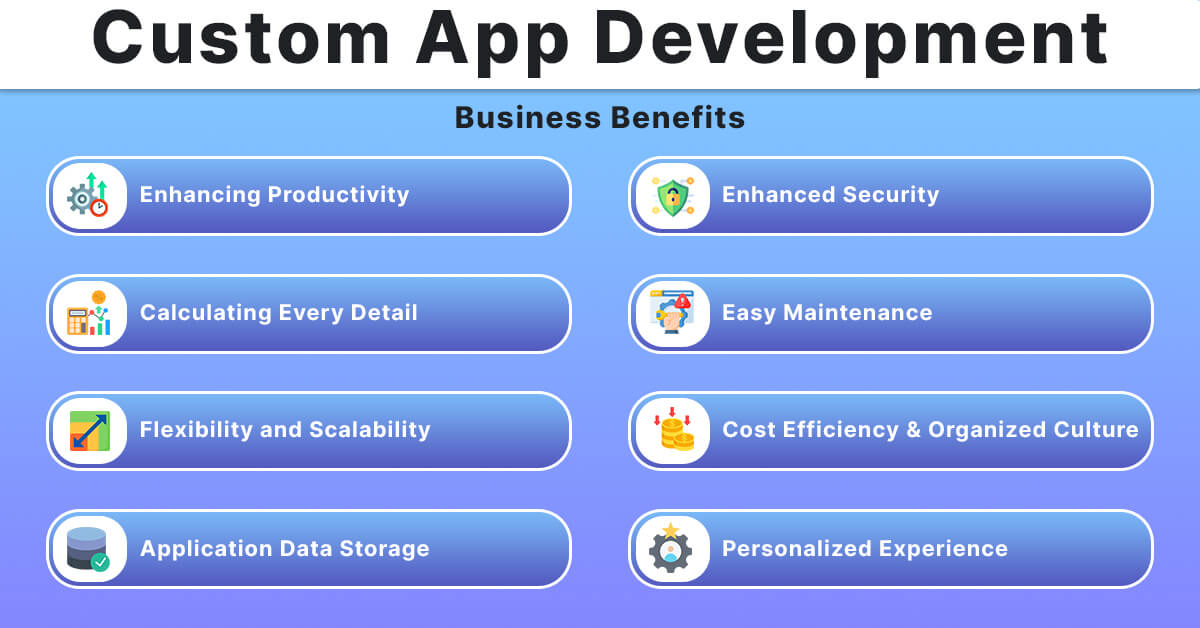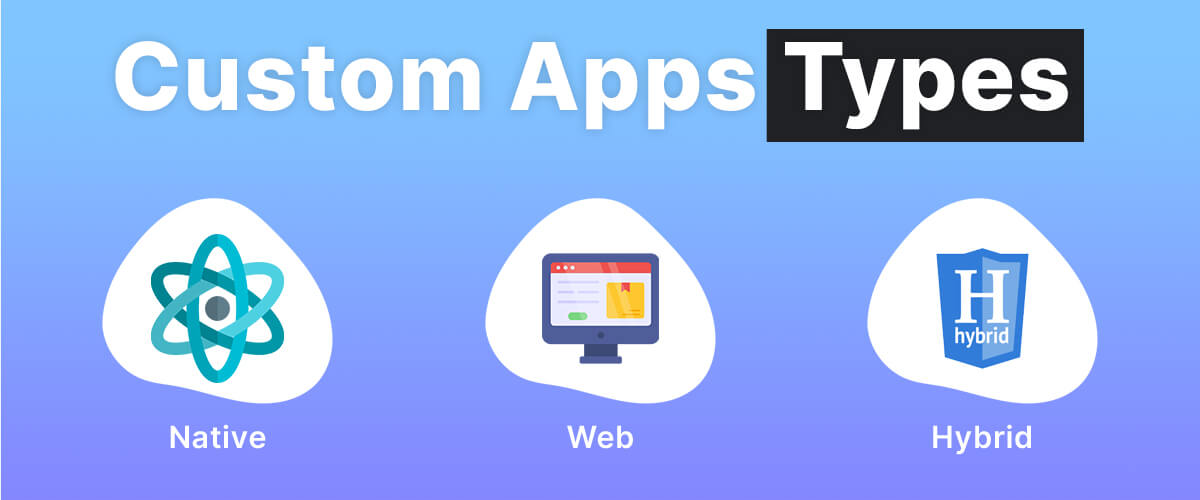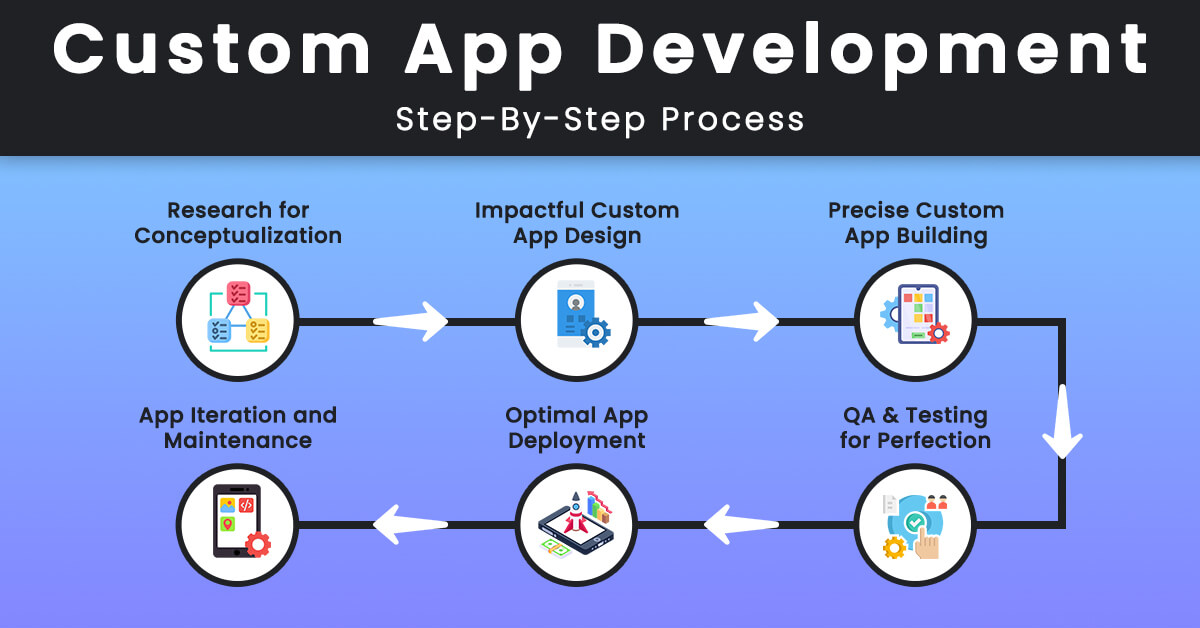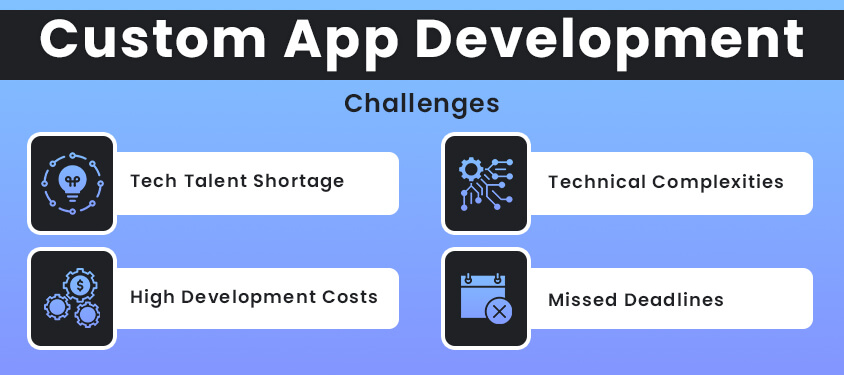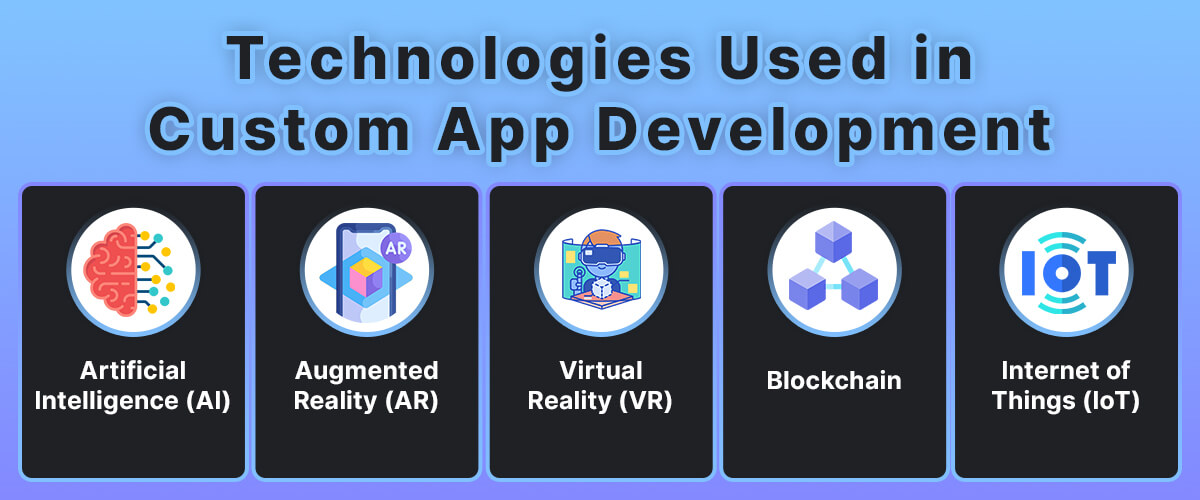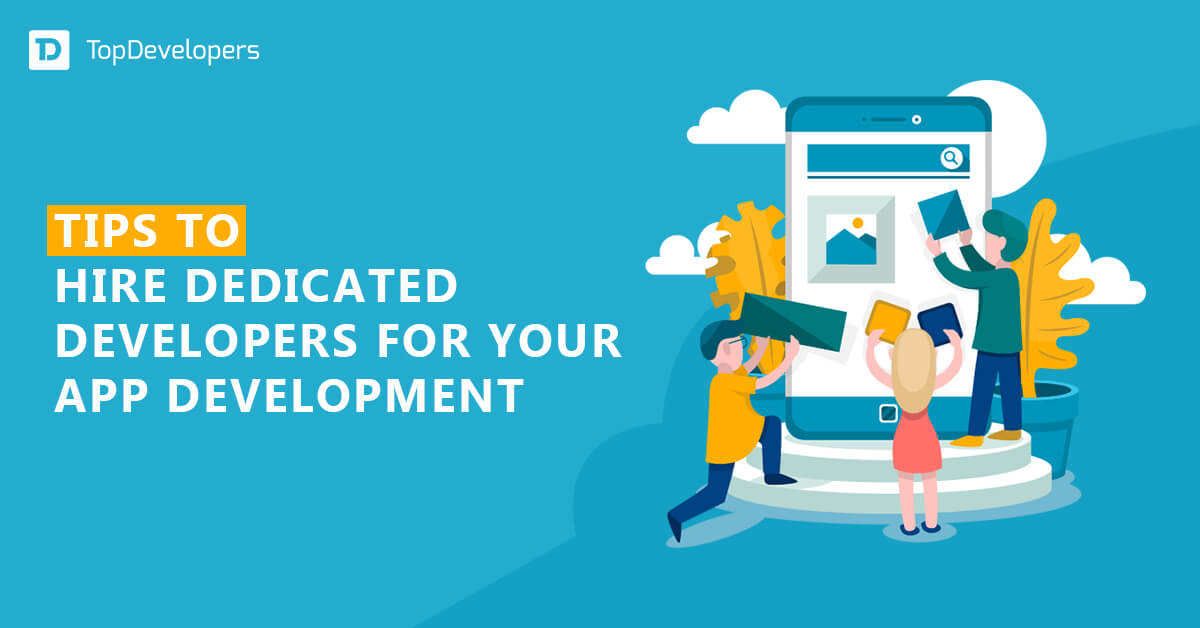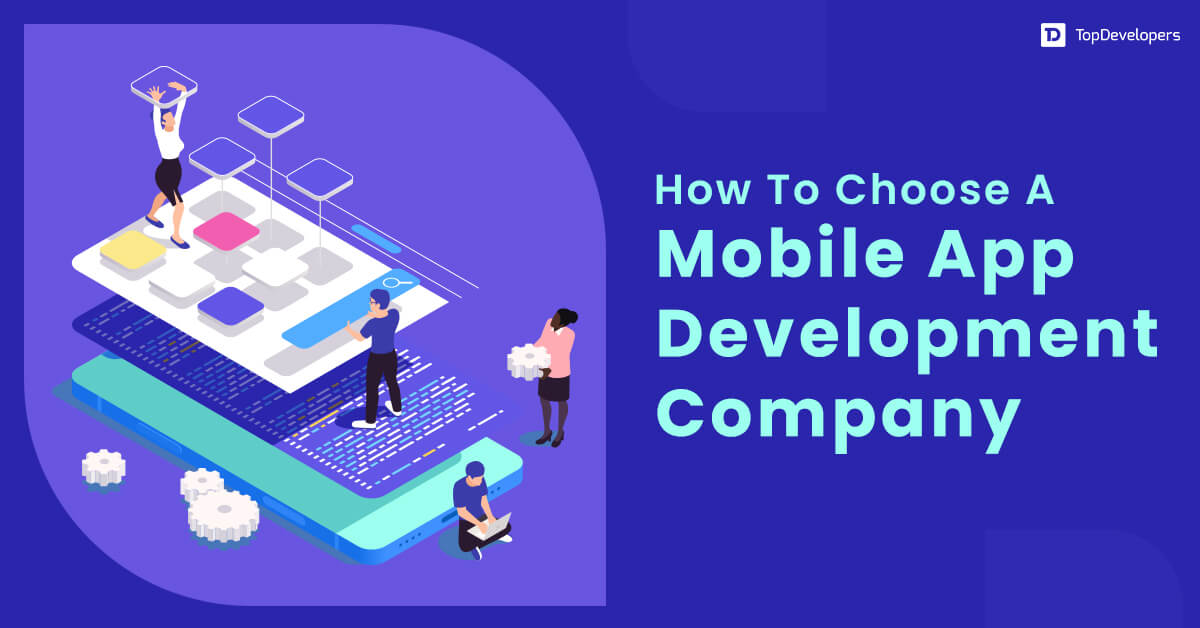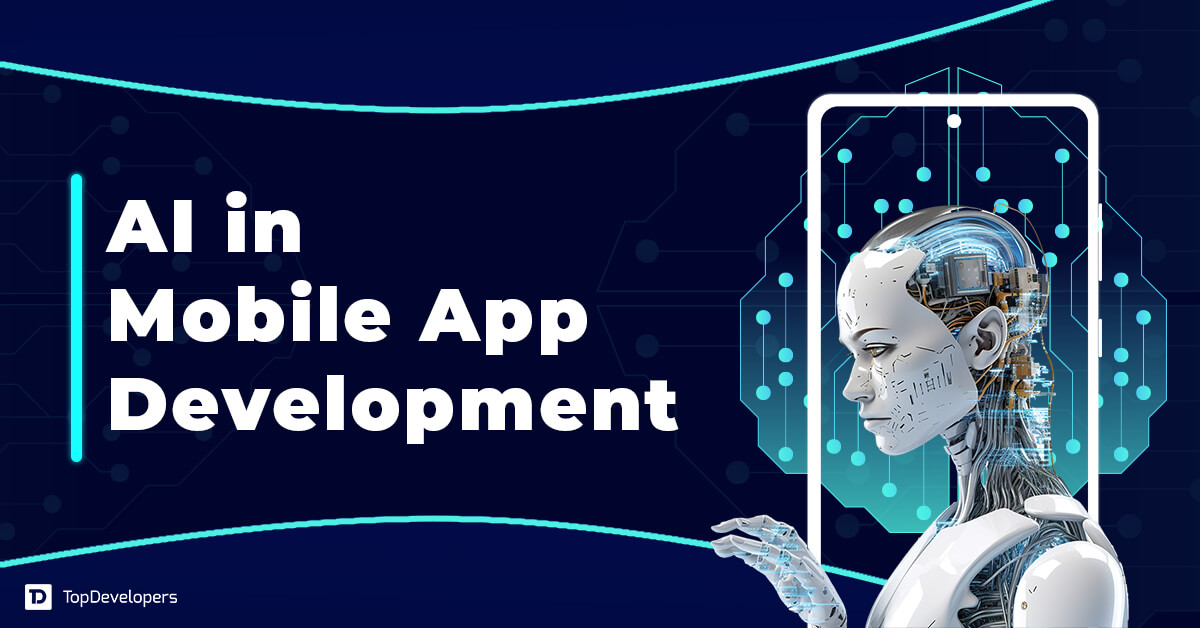
Do you want your business to reach a larger audience? A digital transformation strategy such as Mobile app development is the best option to achieve that goal for you. However, taking the shortest route—considering a semi-readymade app that takes less than 15 days to launch—is costly. White-label solutions are often scrutinized to make sweet promises but fail to meet expectations.
It disappoints businesses as it only partially meets their mobile app needs. Custom app development is an effective solution that bridges the gap between business needs and mobile app requirements. It has revolutionized how businesses operate, connect with customers, sell their offerings, and earn revenue.
This blog will shed light on an overview of custom mobile app development, Its types, and how it benefits businesses, followed by the customized app development process and the challenges businesses face. Also, advanced technologies leverage to build custom apps that let businesses grow and prosper. Let’s dive in!
Table of Contents
What Is Custom Mobile App Development?
Custom mobile app development involves building a mobile app tailored to a business’s specific needs or a specific set of target audiences. The apps are built from scratch with features, functionalities, and UI designs that deliver unique user experiences. They seamlessly integrate with existing legacy systems and facilitate limitless integrations, which ensures better performance and more accessible updates.
Off-the-shelf solutions also promise basic functionalities and optimal design but don’t allow businesses to achieve their goals. This exclusivity makes custom mobile application development the best fit for all types of businesses and transforms your app idea into a perfect solution.
Benefits Of Custom App Development For Businesses
The popularity of custom mobile apps is well known. It offers many advantages that can take a business to its pinnacle and prove that custom apps are the ultimate savior for businesses worldwide.
Enhancing Productivity
White-label solutions won’t facilitate extending the app’s capability with additional functions or high customization that suit the business working style, smooth integration with legacy systems, and synchronization with internal business processes. On the flip side, custom apps are developed and designed to perfectly align with business goals and processes.
The custom mobile application design and development makes employees’ work easier by automating repetitive tasks, improving efficiency, and letting them perform valuable tasks. The improved productivity of employees has the ultimate effect on the business ROI.
Calculating Every Detail
Custom enterprise mobile app development always follows a strategic roadmap while understanding the business organization’s long—and short-term goals. Because of its specific build-up, it can understand even the most minor requirements of the organization and use data that will positively affect it.
As user engagement is considered the most critical aspect of business productivity, custom mobile apps for businesses can provide better user engagement as they are highly centralized and customer-centric.
Flexibility and Scalability
General business apps are usually designed with an essential structure for handling limited resources. As the business grows, it might need help to take the load. However, custom-made apps can cover all the parameters as they are built according to the business needs from their inception, along with adding the best app features.
Moreover, using third-party apps can sometimes limit the scale of flexibility and level of customization for some app features. With custom mobile app development for start-ups, unlimited customization, personalization, and high flexibility are enabled. They can manipulate the functionalities according to their business requirements anytime.
Application Data Storage
Solutions provided by custom mobile apps are highly secured and encrypted. Their complete security features almost nullify the risk to critical business data.
Relying on third-party and cloud-based apps for data security is okay, but it can sometimes be risky. Custom apps designed solely for your business can quickly reinforce data security by taking relevant steps during the mobile app development process.
Enhanced Security
When you opt for an off-the-shelf application, the vendors won’t provide the rights to access the source code, and if there are any loose points, the malware attacks take no time to hack or steal your data. Also, you cannot rest assured of their security measures.
That’s where custom app development ensures all the security features are built to prevent attacks and safeguard data. It provides end-to-end encryption so that data is not leaked while in transit and that the best data security measures are implemented. Also, meeting security requirements from the individual operating systems becomes feasible.
Easy Maintenance
The readymade solution depends on the third-party vendor for app maintenance activities such as updates, new additions, deletions, and others. Custom mobile app design and development eliminates the reliance on third parties, as custom development gives business stakeholders complete control over development, maintenance, and mobile app update activities.
After the app development company provides the business with source code, it can upgrade the app and maintain it hassle-free. In this case, as an appreneur, if you want the top mobile app developers to handle the support and maintenance activities, ask about app maintenance costs initially to avoid conflicts.
Cost Efficiency and Organized Work Culture
For every business, saving money without compromising quality is the ultimate goal. With custom mobile apps, reducing costs becomes quite simple and lucid. They streamline the workflow and eliminate unnecessary work processes, thus saving the organization time and resources. Embracing the automated process will help increase coherency, leading to an increase in savings.
In addition, customized mobile app design and development can improve the organization’s overall work culture. The systems can be easily controlled and processed according to work requirements. Thus, employees can collaborate, and the innovation and knowledge-sharing level can be increased.
Personalized Experience
People of every genre seek a personalized experience; users no longer trade with the business if it is lacking. The bespoke mobile app development from a custom application development company ensures the app is built for users with similar interests, preferences, and needs.
Custom app development introduces a UI/UX design personalization element that enhances user satisfaction, engagement, and retention rates. Considering users’ feedback enables the delivery of a personalized user experience.
Types of Custom Apps
The custom mobile app development services facilitate three types of custom application development based on the platform selected and business goals. Let’s take a closer look at each type.
Custom Native App Development
Custom native app development involves building the app for a specific platform, such as Android or iOS, using respective programming languages, IDEs, tools, and others. Custom native apps can completely access mobile device features and software capabilities, ensuring the best experience with excellent performance.
For example, custom Android app design and development is ideal when you have targeted users using Android devices. Custom mobile app development companies can build separate apps for every platform as per your requirements.
Custom Web Apps
Custom web apps, or PWAs, are popular mobile app development trends. A PWA is a website developed and designed using HTML5, CSS3, JS, React, and Angular, which gives a native-like feel to a web app that runs on a web browser. It ensures high compatibility, as custom web apps are accessible on different devices with a web browser.
The custom web apps render the same performance as native apps and are updated quickly and inexpensively. It’s a good choice for businesses looking to enhance their presence on the internet with a web-based version of the mobile app.
Custom Hybrid Apps
Custom hybrid apps are a blend of native apps and web apps built in sync with the client’s expectations. Hybrid apps are engineered using web technologies such as HTML, CSS, and JS and then encapsulated in a native framework such as Apache, Ionic, or Cordova. Unlike web apps, hybrid apps are installed on mobile devices, but they are web apps that access the device’s native features.
Instagram, Twitter, and Gmail opted for hybrid app development, which enables them to reach a larger audience in reduced time and cost.
Step-By-Step Process For Successful Custom Mobile App Development
The custom mobile app development process is no different from the mobile app development process; that’s research and planning for app development and maintenance. However, there are a few things that you must know during custom development to ensure the best solution from custom mobile app development companies—the six steps, along with a few tips involved in the custom app development project.
Necessary Research for Conceptualization
The custom app conceptualization starts with the discovery phase, which involves market research and verifying the app’s potential to fill the void. Competition analysis is also essential to identify gaps that help find opportunities hidden in plain sight. Post-market, competition, and target audience research are necessary to determine how the audience will receive your app. Conducting surveys with a specific group helps reveal all critical things so that the final app will meet the needs.
The research is followed by business strategy creation, which determines many things, including how the app will be taken to the market, monetization strategies, and more. The research is incomplete without tech stack selection. Considering critical ingredients of the mobile app technology stack ensures the success of custom app development. For example, native development requires platform-specific languages, IDEs, SDKs, and tools.
Last but not least, remember to document all the research and planning under functional and non-functional requirements for the app. The comprehensive documentation includes app development requirements that will be fulfilled by the right technology leverage, database, third-party integrations, and others.
Custom App Design That Speaks
Finding a reliable custom mobile app design and development company is essential to creating an immaculate design that delivers the best experience. The app design starts with low-fidelity wireframes and then extends to detailed mock-ups showing the app’s layout, user flow, visual design, and interactions.
Later, the prototype is created to test the app’s design appeal, usability, and others from the users’ perspective. Using tools like Marvel or InVision enables rich insights into design after defining the business vision.
Building Custom App to the Precision
This stage will shape the app idea into a full-fledged mobile solution. MVP development is always recommended instead of complete app development, as it focuses on the app’s core functionalities and allows testing the users’ review on the app’s USP. After testing the waters with MVP launch, the app is enhanced with more functionalities.
The developers must build the app within a timeline that extends from 4-5 months to a year, depending on the project complexity, developers’ expertise, and tech stack selection.
QA & Testing for Flawless Delivery
Testing and app development work together to identify issues proactively before they worsen app development. Automated testing tools such as Appium implementation detect bugs during development, helping to fix them earlier. Post-app development, beta versions are released to gain users’ feedback before submitting the app to the app store.
Platforms like TestFlight and Google Play beta help distribute apps to beta users to check if they align with their needs. Security testing, compliance testing, and practice testing ensure the app is stable, free from vulnerabilities, follows industry best practices, and complies with the nation’s compliances.
Deployment for the Best Launch
Finally, it’s time to deploy the app to the audience. Before submitting the app to the app store, check that all the functionalities are performed as expected, conduct compliance checks to avoid violation of regulations, perform security audits, document APIs, and ensure the scalability of the backend infrastructure. It ensures that the app will not face any rejection.
When submitting the app to an app store, such as the Apple App Store or Google Play Store, consider the respective guidelines and review the app before launching it on the app store.
Iterate and Maintain the App
The app launch is not the end of the custom app development journey. Continuous deployment with user feedback, new technology trends, or market conditions is essential to making the app thrive continuously. Monitoring user reviews and ratings on the app store, tracking user behavior and engagement with analytical tools, and conducting surveys help identify how the app aligns with the target user base.
Based on the insightful data, the app is iterated and improved to ensure it remains relevant, functional, and excellent for the users.
Challenges In Custom App Development
Custom app development brings businesses a range of benefits compared to readymade solutions. However, complex development is accompanied by many challenges.
Shortage of the Best Tech Talent
The tech talent shortage is accurate, as 75% of employers globally find it difficult to fill job roles. It means it’s challenging to find the right developers, whether building an in-house team or outsourcing an app development project.
With the in-house option, hiring tech talent is a long and time-consuming process. With custom app development outsourcing, the outsourcing company is responsible for finding and providing the right talent. So, businesses only need to find a company with relevant expertise and partner with them while signing a contract that ensures project confidentiality.
High Development Cost
Estimating the accurate custom mobile app development cost is difficult because several changes occur when the app goes on the development floor. For example, new features are added, or technology changes extend app development time and thus the cost. Remember, the developers’ cost is an add-on that increases based on the developers’ geographical location, expertise, and experience level.
Using advanced technologies, third-party integrations, hosting, and ongoing maintenance costs must be considered. All of these increase the total cost of ownership, which must be regarded while budgeting.
Technical Complexity
Technical complexity is part and parcel of the custom app development process. Businesses often want to keep the maximum features in the app that entice users and ensure scalability to accommodate increasing user requests. It increases the app’s complexity, which is challenging to handle.
Staying current with the latest technologies, security measures, and tools enables developers to resolve emerging technical complexities immediately.
Missed Deadlines
Mobile app development involves scope changes and unforeseen situations, which leads to unexpected delays. Delays are not healthy for time-critical projects such as event apps or others.
Implementing the best project management practice ensures that the project gets developed despite scope changes with more resource allocation. Stellar communication among all stakeholders ensures that everyone is on the same page, which helps keep the project on track and timely deliveries.
Emerging Technologies to Enhance Custom App Development
Technology innovations are contributing to improving custom app development with advanced functionalities, amazing design effects, and high performance. Modern businesses leverage the following technologies at scale.
Artificial Intelligence (AI)
AI and ML technologies have become a part of nearly every mobile application. The capability to collect, analyze, and act on data automatically at the speed of light benefits businesses in different ways. For example, Netflix uses AI tech to send personalized content recommendations to users based on the shows they have watched. The most famous AI bots are used for customer support to provide instant queries to users 24/7.
Augmented Reality (AR)
AR capabilities are now recognized by businesses beyond game apps. Displaying the virtual world over real-world objects through device cameras is now used in retail, education, real estate, and travel industries. For example, retail apps are using AR technology to enable virtual try-ons before buying the product. It has benefited popular companies such as IKEA, and Loreal with improved sales and reduced cart abandonment.
Virtual Reality (VR)
VR technology excels at completely immersing users in a new world, as if they have stepped into a new environment. It’s highly usable for training or virtual tours, saving many man-hours. For example, the travel industry allows users to view places to visit virtually through VR apps. The total immersion effect enables users to experience the place, which makes travel package selection easier for them.
Blockchain
The technology is known for security and transparency, which can improve custom mobile apps. When custom apps such as finance, retail, or healthcare apps deal with users’ sensitive data, they must be collected transparently and stored securely. Blockchain- the distributed ledger ensures high data security during transactions with public and private keys.
Internet of Things (IoT)
With mobile app extensions to wearables such as smart watch, smart glass, smart shoes, smart bands, etc, the Internet of Things enables seamless data transfer between sensors attached to objects. For example, a custom fitness app on mobile devices connects with fitness bands or other objects with sensors through IoT technology. This technology is excellent for use in smart homes, remote healthcare monitoring, and industrial applications.
Closing thoughts
Custom app development is trending upward in the mobile app development industry. These apps are developed on the grounds of what users exactly need which brings maximum benefits to the businesses and makes them a top choice of business leaders. Mobilize your business digital needs with custom app development to build the next big thing in the mobile landscape and cherish the abundance of benefits it brings to the table.
 Avantika Shergil
| May 27, 2024
Avantika Shergil
| May 27, 2024
Avantika Shergil is a technology enthusiast and thought leader with deep expertise in software development and web technologies. With over 8 years of experience analyzing and evaluating cutting-edge digital solutions, Avantika has a knack for demystifying complex tech trends. Her insights into modern programming frameworks, system architecture, and web innovation have empowered businesses to make informed decisions in the ever-evolving tech landscape. Avantika is passionate about bridging the gap between technology and business strategy, helping businesses build customized software and website, and understand about different tools to leverage effectively for their ventures. Explore her work for a unique perspective on the future of digital innovation.
